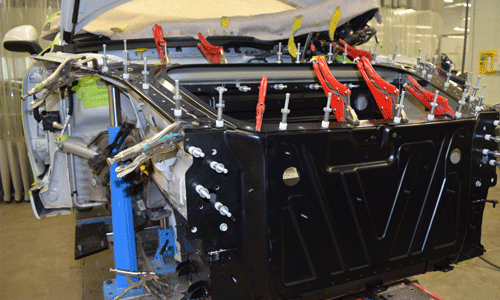By Jeff Sanford
Vaughan, Ontario — July 16, 2015 — The ongoing shift to increased use of aluminum in auto bodies is also leading to an uptick in the use of bonded rivets for attaching parts. Pfaff Autoworks is keeping up with the changes by training technicians in the proper use of bonded riveting.
Today’s most sophisticated cars are making more use of exotic materials. The days when welded steel was the only game in town are long gone. Today, cars like the Ford F-150 and Audi A7 are featuring much more aluminum than ever before.
As OEMs use more of this lightweight metal, more parts are being joined with bonded rivets, and in turn posing new challenges for collision repair technicians.
As it is, riveting can create stronger bonds between a vehicle’s body parts. A riveted body can better withstand a collision. But, if the rivets are not bonded, over time the joints can decay and the bonds will fray. And so it is important in this new era of aluminum that techs are able to carry out quality bonded riveting.
This process sees an adhesive applied along with the rivet. The adhesive takes some of the stress off the rivet and protects against rust and vibration. Pfaff Automotive Partners has been training its techs how to carry out this key modern technique.
“We are Porsche Certified,” says Jeff Pabst, General Manager at Pfaff. “But with Porsche aluminum, there is no welding at all, only bonding and riveting. So we’ve got techs going through the bonding and riveting course.”
It is assumed that bonded riveting will continue to capture market share in the collision repair process as automakers increasingly use aluminum in new vehicle construction.
“Any quarter panel on these cars, this is how they’re repaired,” says Pabst. “Porsche’s cars are also bonded and riveted. There is no welding. So this is a technique you have to understand.”
This is especially true at Pfaff, where high-end exotic European cars are a specialty. The company has been in business since 1964. Today, the company sells a full-range of high-end cars, including Audis, BMWs, Porsches and even McLarens.
Keeping the body techs up to date on how to repair these high-end vehicles is important at Pfaff. Though, with 50 years of experience on these vehicles, the new techniques are being adopted with little fuss.
“Once you’ve learned it. It’s fairly straightforward,” adds Pabst.











































